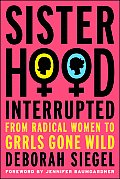
Sisterhood, Interrupted
From Radical Women to Grrls Gone Wild
Siegel, Deborah
Publisher: Palgrave Macmillan
Year Published: 2007
Resource Type: Book
Cx Number: CX7292
A study of controversies in the feminist movement from the 1960s to the 2000s. Siegel wants readers to know about the multifaceted and contentious history of what is called feminism's "second wave" so that they can avoid both the trap of rebelling against its supposed stodgy "political correctness" and that of idealizing its supposedly harmonious "sisterhood".
Abstract:
Looks at how the controversies within the feminist movement have played out in the popular culture of the 1960s through today. Siegel believes that younger women get a very incomplete, caricatured view from popular culture of the feminism which arose in the mid-1960s, which makes this movement seem monolithic.
She wants them to know about the multifaceted and contentious history of what is called feminism's "second wave" so that they can avoid both the trap of rebelling against its supposed stodgy "political correctness," and that of idealizing its supposedly harmonious "sisterhood." She also wants to remedy the view that second wavers get from the mainstream media of "third wavers" -- the new generation of younger feminists -- as not being serious.
The radical feminism of the 1960s and 1970s contained just as many, if not more, competing philosophies as today's. This might be a surprise, not only to the average person who continues to believe the "man-hater" myth, but to the radical feminists themselves, some of whom argue over idealogical purity.
One of the major controversies has been between a view of feminism as a mass movement with the goal of changing society's institutions vs. a view of feminism as self-empowerment
Other controversies have been over sexual liberation and "cultural feminism" and whether they really make any change in society and women's lives or whether they are dangerous distractions from such change.
Siegel also points out that third wavers often think they have invented sexual liberation, which was really a focus of radicals in the second wave, and which Betty Friedan derided as "orgasm politics."
However, the various strands of both radical and liberal feminism have contributed towards both individual empowerment and reforming society, even though the same battles against oppression still must be fought.
Sisterhood, Interrupted was written to reach out to the general public, especially younger women, to help them learn more about the feminist movement and entice them to become active in it. Siegel envisions her book as the start of a conversation in which more feminists will write compreheensive books on feminist theory, activism, and history.
Subject Headings


